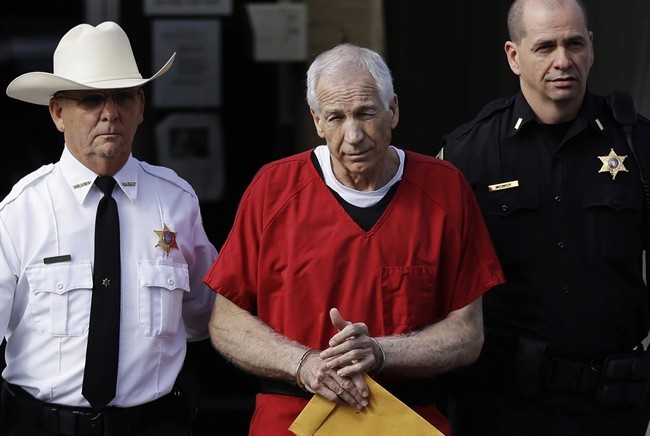HARRISBURG, Pa. – Former Penn State assistant football coach Jerry Sandusky should not get a new trial after being convicted of sexually abusing 10 boys, a Pennsylvania appeals court ruled Wednesday.

Sandusky, 69, is serving a 30- to 60-year prison sentence at a state prison in Pennsylvania. If he does not get the convictions overturned, he is likely to die in prison.
READ MORE: More settlements near in Penn State abuse talks
His case roiled the American sports world and led to the downfall of Hall of Fame coach Joe Paterno, who transformed Penn State into a college football power.
Wednesday’s unanimous decision by a three-judge Superior Court panel came barely two weeks after they heard oral arguments by Sandusky’s lawyer and a state prosecutor.
Defence lawyer Norris Gelman said he planned to ask the state Supreme Court to review the case.
Sandusky had argued his trial lawyers did not have sufficient time to prepare, a prosecutor made improper references to him not testifying on his own behalf and the judge mishandled two jury instructions.
The opinion by Judge Jack Panella said trial judges have discretion about whether to allow pretrial delays, and that in Sandusky’s case the judge carefully considered the continuance requests.
“The decision does not reflect a myopic insistence upon expeditiousness in the face of Sandusky’s request; it was not an arbitrary denial,” Panella wrote.
- What we know — and don’t — in Ontario’s deadly Highway 401 police pursuit crash
- Infant, grandparents killed in Highway 401 crash after police pursuit from LCBO robbery
- London sword attack: 14-year-old killed, 4 injured by man on stabbing spree
- Trump faces jail threat as judge fines him for breaking gag order during trial
Sandusky had wanted the trial judge, John Cleland, to give jurors an instruction about the amount of time it took for nearly all of the victims to report their allegations. Panella wrote that Cleland should have evaluated the need for such a jury instruction based on each victim’s age and maturity, but Cleland’s failure to do so did not harm Sandusky.
“The trial court specifically instructed the jury that they were to consider any possible motives of the victims in coming forward,” Panella wrote. “The vigorous cross-examination of the victims and arguments by defence counsel, when combined with the trial court’s instructions on credibility, clearly defined the issues for the jury.”
The issue related to Sandusky not testifying was not properly preserved for appeals court review, Panella wrote.
The appeals court also turned down another jury instruction claim, related to weighing a defendant’s good character against the allegations.
Messages left for a spokesman for the attorney general’s office were not immediately returned.



Comments